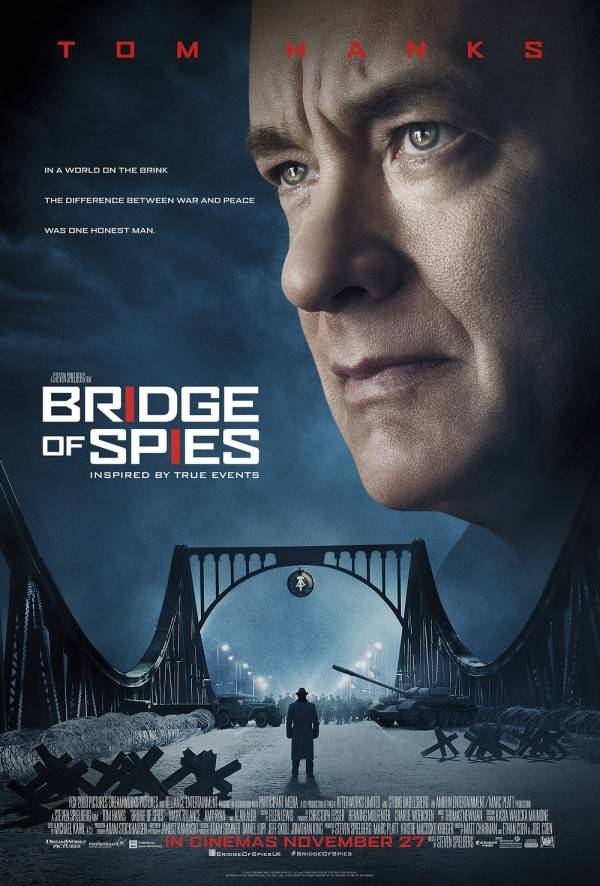"The next mistake our countries make could be the last..."
(James Donovan)
With massive Oscar-winning potential, Bridge of Spies is one of the most enduring war thrillers and spy dramas in recent memory. It has stellar anecdote, spine-chilling pragmatism about humanity, effective negotiation tactics and a step-by-step benevolent approach to ease the intense pressure of an imminent nuclear conflict.
The lethal combo of Oscar winners, Steven Spielberg and Tom Hanks shake hands for the fourth time to entice moviegoers with an unusual storyline marinated with tense clandestine activities, trickery and negotiations – all inspired by historical facts and real life events of back door channels between United States of America and Union of Soviet Socialist Republics during Cold War era.
It tells the anecdote of the famous American U-2 spy plane incident whose pilot was captured by USSR during the massive tense atmosphere of Cold War. To reduce the growing tension, lawyer and skillful political negotiator James B. Donovan played an incredible role between the two super powers. The whole non-fiction plot of Bridge Of Spies revolves around this fable of back door low-profile links and the spy swap.
Starting in 1957, the Brooklyn based insurance attorney James Donovan (Tom Hanks) was designated to defend Soviet spy and painter Colonel Rudolf Abel (Mark Rylance) who was arrested by FBI for espionage charges. The defence attorney was hired to show the world a proper and fair judicial process of United States.
Regardless of the resistance he was facing during the case, Donovan won Abel’s legal battle with 30 years life imprisonment instead of death penalty. He convinced the Supreme Court judge with his weighty argument that Russian spy can be a valuable exchange and a fruitful bargain for future negotiations between super-powers.
After a few years, in 1960, Soviets shot down American U-2 spy plane and captured its pilot Francis Gary Powers (Austin Stowell) who was on a mission to take high resolution photographs of Russian ICBM launching sites at Baikonur Cosmodrome and Plesetsk Cosmodrome.
Despite the lack of any reconnaissance abilities, Donovan was selected by the US government for an undisclosed mission to negotiate a spy swap for Powers in exchange of Abel. Berlin was the destination to hold all the negotiations. Upon reaching Germany, the protagonist lawyer was informed about Frederic Pryor (Will Rogers) an American student who was arrested for espionage charges by German authorities. Keeping aside the guidance and all the opposition of CIA, Donovan tried his best to finalize an exchange deal for three members – Abel for Powers and Pryor during highly tensed negotiations with KGB.
Does the rest of the storyline unfolds like real events of Cold War?
Does the ending part similar to the real incident of spy swap?
Let's leave these questions for you to find out.
The winner of three Academy Awards, seven Golden Globes and two Best Director awards, the master of his craft, Steven Spielberg needs no introduction. He is recognized in Hollywood circles for highlighting humanistic subjects and period movies. For instance, Schindler’s List, Saving Private Ryan and Munich – all stories tried to look at the glitches at global level and stresses morality, ethical principles, and virtuous aims of human spirit for future peace.
Spielberg’s latest venture is an Oscar worthy well-crafted spy thriller in which no one is assassinating anybody; there are no border to border skirmishes, heavy bombardments or firing squads. In fact, it’s a tale of a man who single-handedly bridged the trust gap in the name of humanity during the realpolitik of 1960s. His distinct directorial style energetically endorses the humanistic perspective on radical political disputes and concerns about constitutional rights.
The light toned script by Joel and Ethan Coen has a particular stiffening of humor and satire, but it doesn’t drag the storyline. The wittiness punches at the right moment thus creating a balanced screenplay for spectators. Coen brothers remained faithful to the actual incidents and converted them into engaging and thought-provoking dialogue based plot.
The unfailing Tom Hanks played his lively mild-mannered role with vigilance and strengthened temperament. There is no harm to say it is a Tom Hanks tour de force. Refraining himself from exaggerating the heroism, he creates the flawless equilibrium between the exceptional and average individual. He delivers a convincing, poised and realistic performance during his most quotable monologues and memorable dialogues since Saving Private Ryan.
Another performance highlight is theater actor Rylance who maintained the flow of the screenplay and bolstered Hanks performance with his slow but dignified acting as a calmed and reserved spy. The timing between two characters and silent expressions of Abel’s gaze is a delight to watch.
At the end of the day, Bridge Of Spies is a picture-perfect directorial portrait that fully interprets the anxieties of the historic events, silently. The heart of the movie can be summed up in that it has a loud and reasonable poise in its own chronicle. Spielberg’s visually tasteful hallmark is a potential Oscar winner that will keep you glued to the screen till the end. I highly recommend it for a good weekend watch.
I would rate Bridge Of Spies 4/5 stars.






